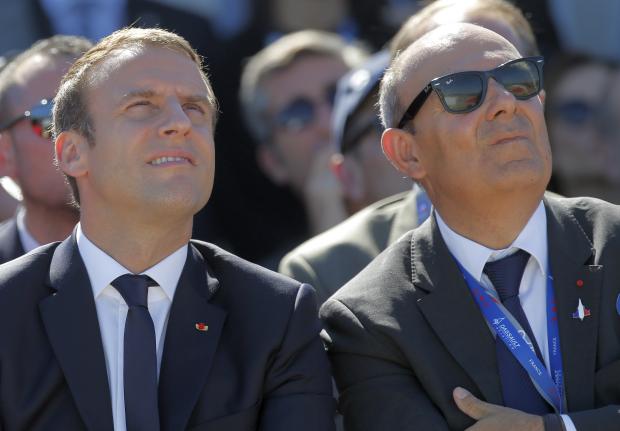
French President Emmanuel Macron and Dassault Aviation CEO Eric Trappier (right) watch demonstration flights as part of the Paris Air Show in Le Bourget, north of Paris, Monday, June 19, 2017. Macron landed Monday at the Bourget airfield in an Airbus A400-M military transport plane to launch the aviation showcase, where the latest Boeing and Airbus passenger jets will vie for attention with a F-35 warplane, drones and other and high-tech hardware. (Pool photo by MICHEL EULER via AP)
PARIS — French President Emmanuel Macron is poised to rearrange his Cabinet after his new centrist party engineered a landslide in the country’s parliamentary election, enabling the government to quickly start passing its first big laws.
Prime Minister Edouard Philippe will resign “in the coming hours” and a new government will be named in the next few days, government spokesman Christophe Castaner said Monday on RTL radio. It’s a largely symbolic move required after a legislative election.
Since Macron’s new party, Republic on the Move!, won an absolute majority in the 577-seat National Assembly, Castaner said the government reshuffling would be “technical and not far-reaching.”
He refused to say whether ministers who have come under corruption suspicions would keep their jobs.
Many victorious parliament members have not held office before. They started arriving Monday at the National Assembly to learn their way around before the first parliament session next week.
After Sunday’s vote, the number of French female lawmakers is the highest ever at France’s lower house of parliament, reaching 38.7 percent – up from 26.8 percent in the outgoing Assembly.
Republic on the Move! and its allies from the Modem party took 350 seats – more than the 289 seats needed for a majority, according to the Interior Ministry’s definitive results.
During a visit to the Paris Air Show, Macron declined Monday to comment on the parliament election. His government is expected to pass its first set of measures during a special parliamentary session starting on June 27 – laws to strengthen security, improve ethics in politics and reform France’s restrictive labor laws.
The conservative Republicans and their allies are the main opposition group in parliament, winning 137 seats. The Socialist Party, which dominated the outgoing Assembly, was the main loser in Sunday’s vote, winning only 29 seats.
Far-left leader Jean-Luc Melenchon’s party won 17 seats, over the minimum of 15 needed to form a group, a tool that provides extra funds and speaking time.
The far-right party National Front party won 8 seats – up from 2 in the outgoing Assembly – including one for its leader, Marine Le Pen.
Le Pen on Monday praised Sunday’s vote as “historic” result but denounced an “anti-democratic voting system” that she says doesn’t represent the “real weight” of her far-right party in the country.
The National Front won 8.75 percent of the votes nationwide, which is more than the Socialists and Melenchon’s far-left party, yet it has less seats.
“We’re worth at least 80 (seats) in my opinion, given the energy we will use to promote our views,” Le Pen told a news conference.
Others agree that France’s current two-round voting system favors mainstream parties and their allies.
Interior Minister Gerard Collomb said the government wants to reduce the number of lawmakers in the future and change the voting system to introduce a partial proportional representation. This would give smaller parties better representation at the National Assembly.